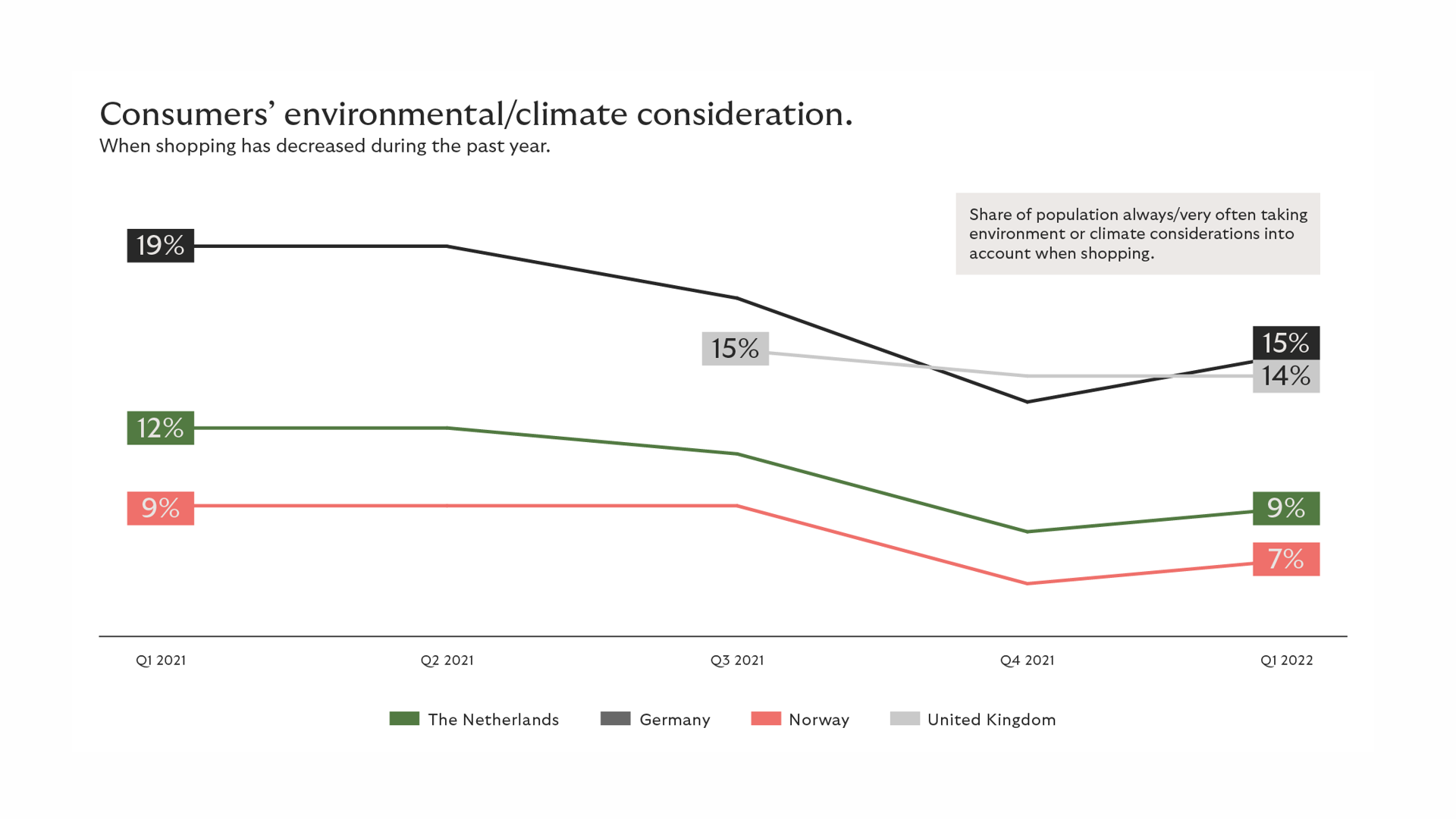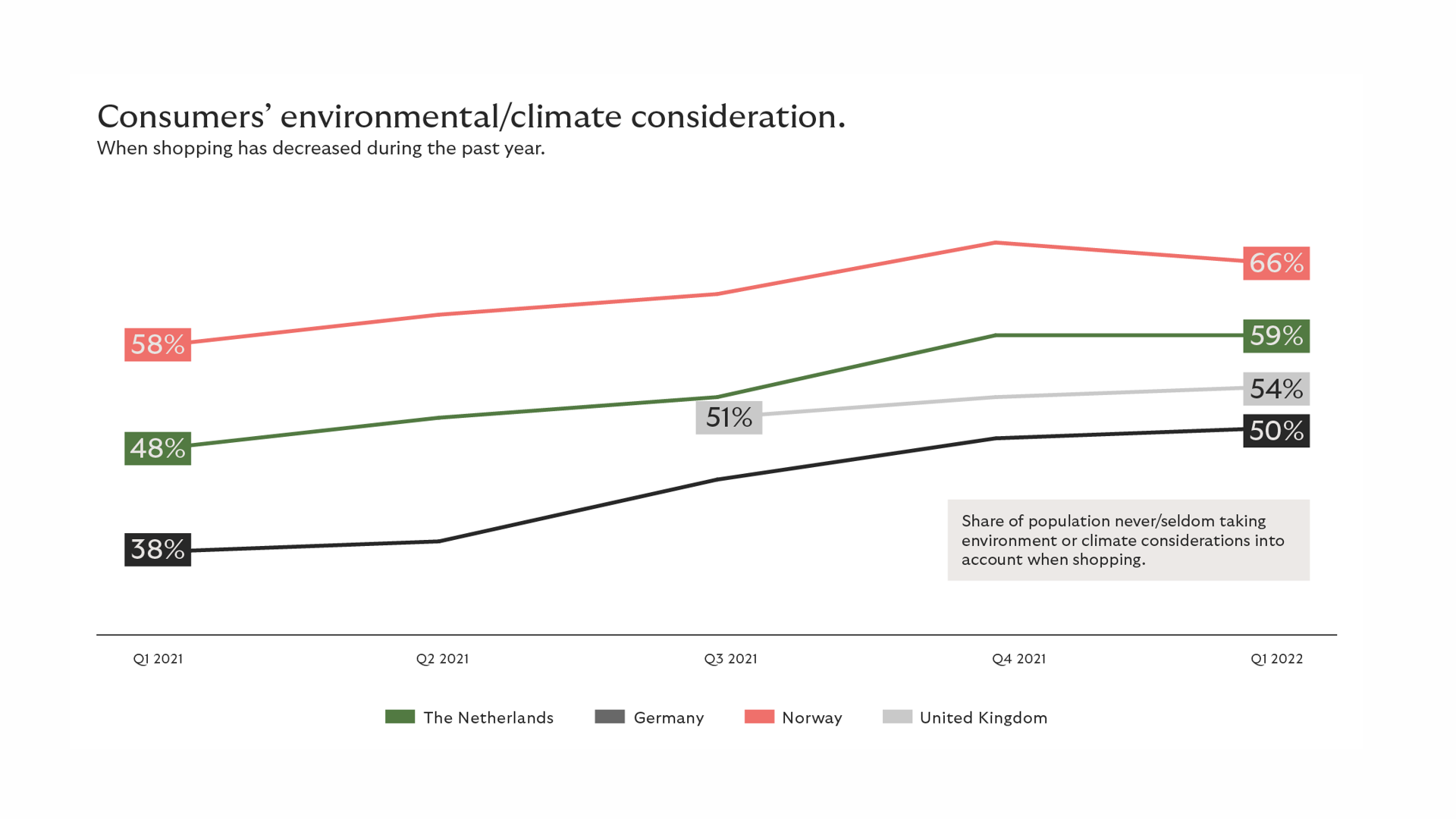Strategizing sustainability.
Going green is still a hot topic among consumers, big brands, and governments. How important is sustainability to online shoppers?

Under a new law, plastic straws, cutlery, plates, cottons swaps and other single-use plastic items are banned in the European Union since July 2021. Plastic bottles, and in many countries soda cans now have a deposit, too. These regulations are to reduce the carbon footprint and eventually have a negative carbon footprint.
Sustainability is becoming increasingly more important in consumer purchases when we see all the studies and reviews published online. Shoppers seem to be actively seeking for webshops and brands that have a sustainable way of driving their business.
Time for an update: how important is sustainability when consumers are shopping online
This is not the first time we touch base on the topic of sustainability in ecommerce. But this will be the first time we dive into consumer considerations in the post-covid era. Since we see that the online shares are slowly dropping a bit, it spikes our curiosity to find out whether the way shoppers seek out their purchases is changing as well. Want to know about which country is most environmental/climate considerate? And who of the shoppers say they always take the climate in consideration while shopping online? How can webshops act more sustainable and voice that to consumers? Keep reading this new blog!
Going against the stream: consumers are less considerate towards the environment and climate when shopping online in 2022
Consumers environmental/climate consideration when shopping is down significantly. In the first quarter of 2021 an average of 13.6% thinks about the climate when making online purchases. One year later that percentage drops to 11.5% However, zooming in on country statistics tells us about big differences.

Whereas before (in q1 of 2021) the share of German shoppers that always/very often takes the environment or climate in consideration when shopping was 19%, now shrinks to 15%. From the Dutch shoppers 12% claims to be considerate in q1 of 2021, and now only 9% is considerate. Norwegians follow the same pattern: from 9% in q1 of 2021, to a current 7%. The United Kingdom is added to our studies later in 2021, hence we only know the current share of considerate shoppers, which is 14%.
We can only speculate as to why there is a decrease of consideration. Our estimate is the pandemic. We both entered and exited 2021 with a new virus variant and lockdown. Being considerate towards the environment and climate seems like a logical explanation for a higher share, as people want to take care of themselves and surroundings. With the pandemic behind us, shoppers may fall into their old habits and beliefs. That may cause the drop in share of considerations when shopping now.
German and UK shoppers are most environmental/climate conscientious
But there is also other concerning news to tell. The share of never/seldom taking the environmental/climate into consideration is going up in all countries. Norway’s share goes up from 58% (in Q1 of 2021) to 66%. The Dutch share increases from 48% to 59%. Germany is next with going from 38% (Q1 2021) to the current 50%. The single measurement from the UK sticks at 54%.
That means Germany and the UK lead with their numbers of being the most environmental/climate conscientious, and NL and NO consumers being the least.
The consideration is increasing slightly in the in the first quarter of 2022, compared to the last quarter of 2021. That means it could be an indication of a swing back that the share of consideration is going back to the levels of Q1 and Q2 of 2021. The decrease is broken, and slows back to increase. In the next quarter of 2022, we will know if it keeps increasing or not.

Young, working full time and a higher disposable income cater to a higher climate consideration
Consumers that always/very often consider the environment/climate when shopping are similarly composed across all 4 countries. The share of the considerate shoppers is 7-15% (Netherlands 9%, Germany 15%, Norway 7% and the UK 14%). These shoppers have in common that they are younger, to a large extent in the pre-family/family life stage, work full time, and thus having a higher disposable income. Other features of the more considerate shopper are being more loyal to shopping online (vs offline) and buying online more frequently. It is safe to say that the Heavy Online Shopper is being over-represented here and that the online share of their total spend is higher.
What does this mean for merchants?
For merchants it is essential to identify key points in the customer journey where sustainability is a concern for consumers, and consequently offer (environmentally concerned) consumers the correct type of information or service options. Think of additional information on the impact of different delivery options on the environment or offering consumers an eco-friendly packaging option.
Use sustainability as your marketing tool
The young, working full time with a higher disposable income are looking to better their purchases when shopping online. They are aware of what they can do and opt for more environment/climate-friendly options. These shoppers seek for brands that match their values. They want to buy from a business that cares, and when no options are being offered to them, they might seek it elsewhere.
By connecting with your conscious consumers via a sustainable strategy will creates a deeper connection. Pioneering together with your audience will attract other new shoppers, too. These value-driven consumers are likely to be loyal to a doing-good or doing-better business, just like any long-term relationship. When consumers embrace your values, they are also willing to pay a premium for sustainable brands. Consumers see themselves as an extension of a sustainable business or webshop and are the catalysts for making a difference. In other words: sustainability sells.

